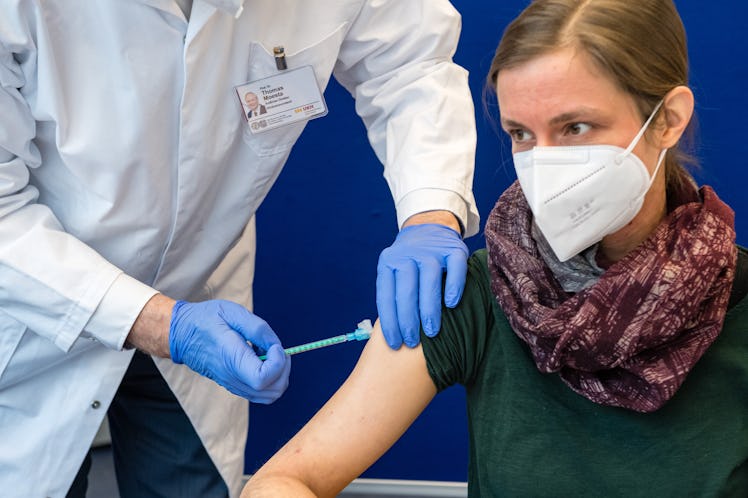
Here's What To Expect About COVID Vaccine Requirements On Campus This Fall
There’s a lot of back and forth on this one.
Swaths of the United States are finally seeing the light at the end of the tunnel when it comes to the COVID-19 pandemic. But given low rates of youth vaccination, many college students are still having to take extra precautions to slow the spread. As of July 2021, multiple vaccines are now approved for people ages 12 and up, and are widely available. So, with these factors in mind, many college students are likely wondering: Will colleges require a coronavirus vaccine in fall 2021? Here's what we know.
School vaccination laws are determined on a state-by-state basis, and it’s already pretty standard for colleges and universities to require students to receive vaccines against diseases like rubella, meningitis, and chicken pox, per the Centers for Disease Control and Prevention (CDC). Of course, each state includes its own approach to vaccine exemptions for religious and medical reasons. However, the COVID-19 vaccine’s Emergency Use Authorization (EUA) status from the U.S. Food and Drug Administration (FDA) can create complications. Universities are legally allowed to require proof that students have been vaccinated against other transmissible illnesses, but some state lawmakers argue that as long as the COVID-19 vaccine is categorized for “emergency use only,” these universities can’t make inoculation mandatory.
But on July 19, a U.S. district court ruled that universities had the right to require students to receive the COVID-19 vaccine for in-person learning. Judge Damon Leichty of the U.S. District Court for Northern Indiana ruled in favor of Indiana University, which had faced a student-led lawsuit that argued a vaccine mandate from the university would violate their right to bodily integrity and autonomy. The lawsuit also argued that because of its EUA status, the COVID-19 vaccine shouldn’t be part of the range of vaccinations required by universities.
Per The New York Times, the ruling affirmed the school could indeed require students to receive the COVID-19 vaccine, with exceptions for religious objections, documented vaccine allergies, medical deferrals, or online learning. “The Fourteenth Amendment permits Indiana University to pursue a reasonable and due process of vaccination in the legitimate interest of public health for its students, faculty and staff,” Leichty stated in his ruling. Lawyer James Bopp Jr., known for promoting right-wing causes in his legal work, plans to appeal the case to the U.S. Supreme Court after Leichty’s ruling.
While universities in states like New York and California have carried out vaccine mandates with little pushback, universities in Republican-controlled states like Indiana, Arizona, and Texas are facing blockages from both state lawmakers and pending lawsuits. Arizona Gov. Doug Ducey has issued an executive order banning public universities from adopting COVID-19 vaccine mandates, Florida Gov. Ron DeSantis has passed legislation banning both public and private universities from doing so, and Texas’ Gov. Greg Abbott has issued an executive order preventing any institution that receives public funds from adopting vaccine mandates — including some private universities.
“Government should not require any Texan to show proof of vaccination and reveal health information just to go about their daily lives,” Abbott stated in an April 2021 video announcing the order.
To avoid potential legal backlash in the form of lawsuits, many public and private universities have adopted a “wait and see” approach to determine the legality of a COVID-19 vaccine mandate. Others are simply just waiting for the COVID-19 vaccine’s official approval from the FDA, which may happen within the next six months, per Healthline. However, after Leichty’s ruling in favor of Indiana University, more colleges and universities may begin to adopt guidelines similar to Indiana University’s.
According to the CDC, as of July 22, almost 162 million Americans have been fully vaccinated. However, this is only 47.6% of the United States' total population. Experts say that to achieve herd immunity, "roughly 50 to 80% of the population will need to be [fully] vaccinated," per the Cleveland Clinic. And according to a June 25 report from the CDC, college-age Americans have some of the lowest inoculation rates, and are among the least likely to make plans to get vaccinated, despite expanded access. “Continued targeted efforts are needed to accelerate vaccination rates,” the report states. “Especially among younger adults.”
As of July 22, nearly 600 colleges plan to adopt vaccine requirements for students or employees on campus, per the Chronicle of Higher Education. To see a comprehensive list of those colleges, you can check here. You can also check with your school directly to see if a vaccination policy will be in effect for the fall semester. If you're unvaccinated, the CDC still recommends wearing masks and social distancing, especially now that more contagious COVID-19 variants are circulating across the country. So, while many college campuses may not explicitly require your coronavirus vaccine records by the time fall 2021 rolls around, they'll still probably encourage you to get vaccinated, and to always follow proper health and safety guidelines.
This article was originally published on